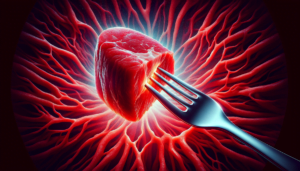If you’ve ever wondered about the impact of unhealthy fats on your overall health, look no further. This article explores the detrimental effects of consuming unhealthy fats and how they can be detrimental to your well-being. From increasing the risk of heart disease to contributing to weight gain, this informative piece sheds light on why it’s important to be mindful of the fats we consume. So, grab a cup of tea and prepare to discover the dangers of unhealthy fats and the steps you can take to make healthier choices.
Overview
Unhealthy fats are a type of dietary fat that can negatively impact our health when consumed in excessive amounts. These fats are often found in processed foods, fast foods, and commercial baked goods. There are two main types of unhealthy fats: trans fats and saturated fats. These fats can lead to various health problems, including an increased risk of heart disease, obesity and weight gain, and elevated cholesterol levels. It is important to be aware of the sources of unhealthy fats and take steps to reduce their consumption for optimal health.
Effects on Health
Risk of Heart Disease
Consuming unhealthy fats, particularly trans fats and saturated fats, can significantly increase the risk of developing heart disease. These fats have been shown to raise levels of LDL (low-density lipoprotein) cholesterol in the blood, also known as “bad” cholesterol. High levels of LDL cholesterol can contribute to the formation of plaques in the arteries, leading to atherosclerosis and an increased risk of heart attacks and strokes. To protect your heart health, it is crucial to minimize the intake of these unhealthy fats.
Obesity and Weight Gain
Unhealthy fats are high in calories and can contribute to weight gain and obesity when consumed in excess. Foods high in unhealthy fats are often calorie-dense and provide little nutritional value, leading to an imbalance in energy intake and expenditure. The excessive consumption of these fats can lead to an accumulation of body fat and an increased risk of obesity-related conditions such as diabetes, high blood pressure, and certain types of cancer. Adopting a balanced and healthy diet that limits the intake of unhealthy fats is essential for maintaining a healthy weight.
Increased Cholesterol Levels
Consuming unhealthy fats can also raise cholesterol levels in the body, specifically the levels of LDL cholesterol. High levels of LDL cholesterol can contribute to the formation of plaques in the arteries, leading to narrowed and hardened arteries (atherosclerosis). This can restrict blood flow and increase the risk of cardiovascular diseases. It is important to monitor your cholesterol levels and limit the intake of unhealthy fats to maintain optimal cardiovascular health.
Sources of Unhealthy Fats
Processed and Fast Foods
Processed and fast foods are often packed with unhealthy fats. These foods are typically high in trans fats and saturated fats, which are used to enhance flavor, texture, and shelf life. Burgers, fries, fried chicken, potato chips, and other similar foods are commonly associated with high levels of unhealthy fats. To reduce your intake of unhealthy fats, it is best to limit the consumption of processed and fast foods and opt for healthier alternatives.
Deep-Fried Foods
Deep-fried foods are known for their delicious taste but are also notorious for being high in unhealthy fats. Fried chicken, french fries, doughnuts, and crispy snacks are often deep-fried, resulting in a significant increase in trans fats and saturated fats. These fats can contribute to weight gain, elevated cholesterol levels, and other health problems. It is advisable to limit the consumption of deep-fried foods and opt for healthier cooking methods such as baking, grilling, steaming, or sautéing.
Commercial Baked Goods
Commercial baked goods like cookies, cakes, pastries, and muffins often contain unhealthy fats. Trans fats and saturated fats are commonly used in the production of these treats to improve texture and extend shelf life. It is important to be mindful of the ingredients listed on the packaging and choose healthier alternatives or homemade versions of baked goods to reduce the consumption of unhealthy fats.
Trans Fats
Definition of Trans Fats
Trans fats are a type of unsaturated fat that undergoes a process called hydrogenation, which transforms liquid vegetable oils into solid fats. Trans fats are commonly found in processed foods and are used to enhance texture, extend shelf life, and improve flavor stability. Trans fats can be found in margarine, fried foods, baked goods, and some fast foods.
Health Risks
Consuming trans fats can have serious health risks. Trans fats have been shown to significantly raise levels of LDL cholesterol, lower levels of HDL (high-density lipoprotein) cholesterol, and increase the risk of heart disease and stroke. Additionally, trans fats have been linked to inflammation, insulin resistance, and an increased risk of type 2 diabetes. To protect your health, it is crucial to minimize the consumption of trans fats.
Foods Containing Trans Fats
Foods that often contain trans fats include margarine, shortening, fried foods, commercially baked goods, and some processed snacks. It is important to read food labels and check for the presence of trans fats, as they are often listed as “partially hydrogenated oils.” By choosing foods with little to no trans fats, such as those made with healthier oil alternatives, you can reduce your intake of this harmful fat.
Saturated Fats
Definition of Saturated Fats
Saturated fats are a type of fat that is naturally solid at room temperature. They are commonly found in animal products like meat, poultry, and full-fat dairy, as well as tropical oils like coconut and palm oil. Saturated fats are also present in processed foods and fast foods.
Health Risks
Consuming high amounts of saturated fats can increase levels of LDL cholesterol in the blood, leading to an increased risk of cardiovascular diseases. Saturated fats can contribute to the build-up of plaques in the arteries, reducing blood flow and potentially causing heart attacks and strokes. To maintain optimal health, it is important to limit the intake of saturated fats.
Foods High in Saturated Fats
Foods rich in saturated fats include fatty cuts of meat, poultry with skin, full-fat dairy products like cheese, butter, and cream, as well as tropical oils like coconut and palm oil. To reduce your intake of saturated fats, opt for lean cuts of meat, skinless poultry, low-fat dairy alternatives, and healthier cooking oils such as olive oil or avocado oil.
Hidden Unhealthy Fats
Overview
Hidden unhealthy fats refer to fats that are present in foods that may not appear high in fat but still contribute to overall fat intake. These fats can be present in a variety of processed and packaged foods, including salad dressings, condiments, and snacks.
Reading Food Labels
To identify hidden unhealthy fats, it is important to read food labels carefully. Look for ingredients like hydrogenated oils, partially hydrogenated oils, and palm oil, which are often sources of unhealthy fats. Additionally, pay attention to the serving size and the number of servings per container to accurately assess the amount of fat you are consuming.
Common Foods with Hidden Unhealthy Fats
Food items that commonly contain hidden unhealthy fats include salad dressings, mayonnaise, creamy sauces, prepackaged meals, microwave popcorn, and flavored snacks. Healthier alternatives like homemade dressings, low-fat or light versions of condiments, and whole foods without added oils can help reduce your intake of these hidden unhealthy fats.
Balancing Healthy Fats
Importance of Healthy Fats
While excessive consumption of unhealthy fats can have detrimental effects on health, it is important to remember that not all fats are bad. Healthy fats, such as monounsaturated fats and polyunsaturated fats, are essential for overall well-being. These fats can contribute to heart health, brain function, and the absorption of fat-soluble vitamins.
Choosing Healthy Fat Sources
Healthy fat sources include nuts, seeds, avocados, olive oil, fatty fish like salmon and mackerel, and plant-based oils like flaxseed and canola oil. These fats should be consumed in moderation as part of a well-balanced diet. Cooking methods like steaming or sautéing with minimal oil can help retain the nutritional benefits of these healthy fats.
Recommended Daily Intake
The American Heart Association recommends that the majority of fat intake should come from unsaturated fats, while limiting the intake of saturated fats and avoiding trans fats altogether. Aim to consume about 20-35% of your total daily calories from fats, with saturated fats accounting for less than 7% of total calories. It is essential to consult with a healthcare professional to determine the appropriate fat intake for your specific dietary needs.
Tips for Reducing Unhealthy Fats
Cooking and Food Preparation Techniques
Opt for healthier cooking methods like baking, grilling, steaming, or sautéing instead of deep-frying foods. Use minimal amounts of oil and consider using healthier oil alternatives, such as olive oil or avocado oil. Trim visible fat from meats and remove the skin from poultry to reduce saturated fat intake.
Making Healthy Substitutions
Choose healthier alternatives for unhealthy fats in your diet. Replace butter with healthier spreads or oils, opt for low-fat or light versions of condiments, and swap high-fat dairy products with their low-fat counterparts. Incorporate plant-based fats like nuts, seeds, and avocados into your meals and snacks.
Eating Out Wisely
When dining out, be mindful of the fats present in restaurant meals. Choose grilled or poached options instead of fried dishes, ask for dressings and sauces to be served on the side, and opt for healthier sides like steamed vegetables instead of fries. Being proactive and asking about the ingredients and cooking methods can help you make healthier choices when eating out.
Effects of Unhealthy Fats on Specific Organs
Heart and Cardiovascular System
Unhealthy fats, particularly trans fats and saturated fats, can have detrimental effects on the heart and cardiovascular system. High intake of these fats can lead to the development of atherosclerosis, which can increase the risk of heart attacks and strokes. It is important to reduce the consumption of these fats to maintain a healthy heart and cardiovascular system.
Liver and Gallbladder
Excessive intake of unhealthy fats can burden the liver, as it is responsible for metabolizing fats. Consumption of saturated fats and trans fats can contribute to the accumulation of fat in the liver, leading to non-alcoholic fatty liver disease. Additionally, a high intake of unhealthy fats may increase the risk of developing gallstones by affecting the balance of cholesterol in the gallbladder.
Brain and Nervous System
Consuming unhealthy fats can also impact brain function and the nervous system. Trans fats, in particular, have been associated with an increased risk of cognitive decline and neurodegenerative diseases such as Alzheimer’s disease. By reducing the intake of unhealthy fats and opting for healthier fat sources, you can support brain health and overall neurological function.
Conclusion
The importance of reducing unhealthy fats in our diet cannot be overstated. Consuming excessive amounts of trans fats and saturated fats can lead to a wide range of health problems, including an increased risk of heart disease, obesity, and elevated cholesterol levels. By being mindful of the sources of unhealthy fats and making positive dietary choices, such as opting for healthier fats, reading food labels, and making smart substitutions, we can strive for a balanced and healthy diet. Remember, your health is in your hands, so choose wisely when it comes to the types of fats you consume.





